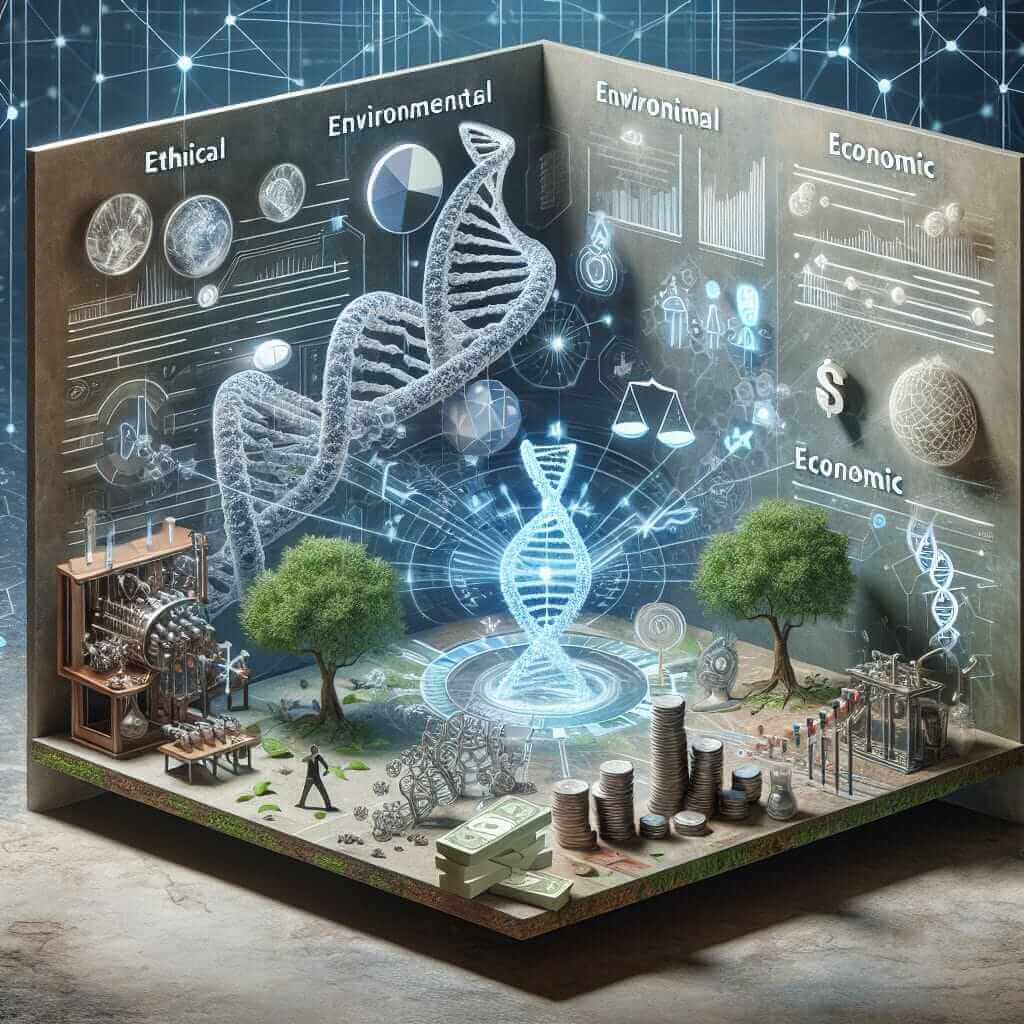The IELTS Reading section is a critical component of the IELTS exam. It tests your ability to read and comprehend a variety of texts, identify key ideas, and understand specific details within a limited time. One widely discussed topic in recent IELTS exams is “Social implications of biotechnology.” This topic reflects the evolving concerns and debates surrounding the biotechnological advancements and their impact on society.
You might wonder why this topic appears frequently. The social implications of biotechnology touch upon various aspects of human life and resonate with numerous ethical, environmental, and economic issues. Given its relevance, preparing for such topics not only enhances your IELTS Reading skills but also broadens your general knowledge.
Reading Passage: Social Implications of Biotechnology
The Role of Biotechnology in Modern Society
Biotechnology has revolutionized various sectors, from agriculture to medicine, offering unprecedented opportunities and solutions. However, the social implications of biotechnology are complex and multifaceted, involving ethical, environmental, and economic dimensions.
Ethical Considerations
Biotechnology’s capability to manipulate genetic materials raises significant ethical questions. The controversy surrounding genetically modified organisms (GMOs), cloning, and gene editing techniques like CRISPR, illustrates the ethical dilemma. Critics argue that such technologies could lead to unforeseen consequences, including genetic discrimination and loss of biodiversity.
Environmental Impact
The environmental implications of biotechnology are profound. Genetically modified crops, for instance, promise higher yields and pest resistance, but they also pose potential risks to ecosystems. The fear of cross-contamination between GM crops and wild species has sparked debates on the sustainability of biotechnological advancements.
Economic Consequences
Economically, biotechnology offers both promises and challenges. While it has the potential to boost productivity and create new industries, it also raises concerns about equity and access. Small-scale farmers and developing countries might struggle to compete with larger entities that possess advanced biotechnological tools.
Public Perception
Public perception plays a crucial role in shaping the development and acceptance of biotechnological innovations. Misinformation and lack of understanding often fuel public resistance. Therefore, transparent communication and robust regulatory frameworks are vital to address public concerns and harness biotechnology’s full potential for societal benefit.

Practice Questions
Questions 1-5: True/False/Not Given
- Biotechnology only has positive implications for society.
- GMOs are universally accepted as safe and beneficial.
- Cross-contamination between GM crops and wild species is a common environmental concern.
- Small-scale farmers often benefit the most from biotechnological advancements.
- Transparent communication can help mitigate public resistance towards biotechnology.
Questions 6-10: Matching Information
Match each statement with the correct conclusion based on the text.
- 6. Ethical concerns of biotechnology
- 7. Environmental risks of GM crops
- 8. Economic disparities in biotechnology
- 9. Importance of public perception
- 10. Potential genetic discrimination
A. Could lead to loss of biodiversity
B. Involves manipulating genetic materials
C. Small-scale farmers may face challenges
D. Misinformation affects acceptance
E. Result of advanced gene editing techniques
Answers
-
False – The text indicates that biotechnology has both positive and negative implications for society.
-
False – The text mentions that GMOs raise significant ethical questions and are controversial.
-
True – The text specifically highlights cross-contamination as a concern.
-
False – The text suggests that small-scale farmers might struggle to compete.
-
True – Transparent communication is mentioned as vital to addressing public concerns.
-
B – Ethical concerns involve manipulating genetic materials.
-
A – Environmental risks of GM crops could lead to loss of biodiversity.
-
C – Economic disparities mean small-scale farmers may face challenges.
-
D – Public perception is influenced by misinformation.
-
E – Genetic discrimination could result from advanced gene editing techniques.
Common Mistakes to Avoid
When tackling the reading section:
- Skimming vs. Scanning: Don’t confuse skimming (quickly reading for gist) with scanning (looking for specific information). Use these methods appropriately.
- Time Management: Practice managing your time effectively. Allocate time per passage and questions to avoid spending too much time on one section.
- Understanding Keywords: Look for keywords in questions and match them with the passage to find the answers.
Vocabulary
- Genetically Modified Organisms (GMOs) (noun): /ˌdʒen.ə.tɪ.kəl.i ˌmɒd.ɪˈfaɪd ˌɔː.ɡə.nɪ.zəmz/ – Organisms whose genetic material has been artificially altered.
- CRISPR (noun): /ˈkrɪs.pər/ – A technology used for editing genomes.
- Cross-contamination (noun): /krɒs ˌkɒn.tæm.ɪˈneɪ.ʃən/ – The transfer of harmful bacteria or other microorganisms.
- Biodiversity (noun): /ˌbaɪ.əʊ.daɪˈvɜː.sɪ.ti/ – The variety of plant and animal life in a particular habitat.
Grammar Focus
Conditional Sentences
- Type Zero Conditionals: Used for scientific facts or general truths.
- Structure: If + present simple, present simple
- Example: If GMOs are released into the wild, they can cross-contaminate with native species.
Advice for High Scores in IELTS Reading
- Practice Regularly: Familiarize yourself with different types of texts and questions.
- Improve Vocabulary: Expand your vocabulary to understand complex texts better.
- Develop Analytical Skills: Focus on understanding the author’s arguments and viewpoints.
- Review Mistakes: Go through the mistakes you frequently make and learn from them.
By understanding both the content and structure of IELTS Reading passages, you can strategically prepare yourself to excel in this section. Engaging with current and relevant topics like the “social implications of biotechnology” enhances not just your IELTS performance but also your critical thinking skills.